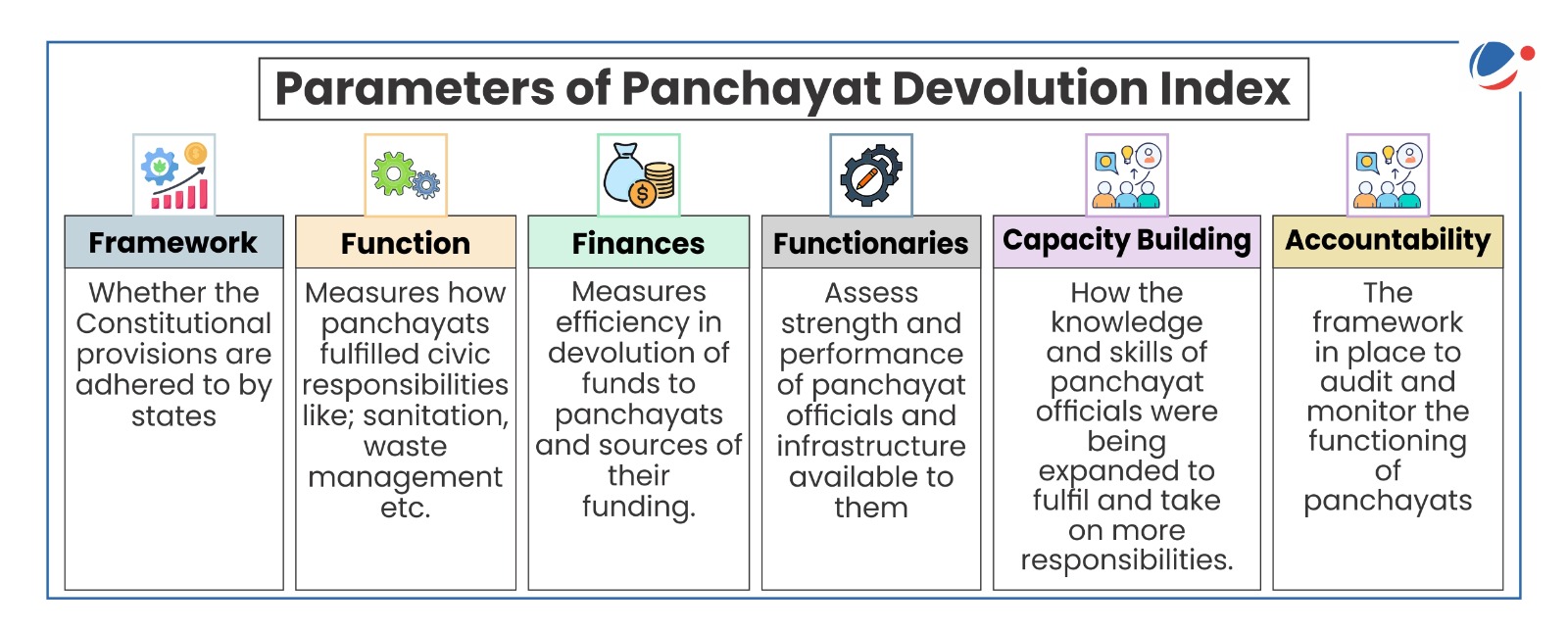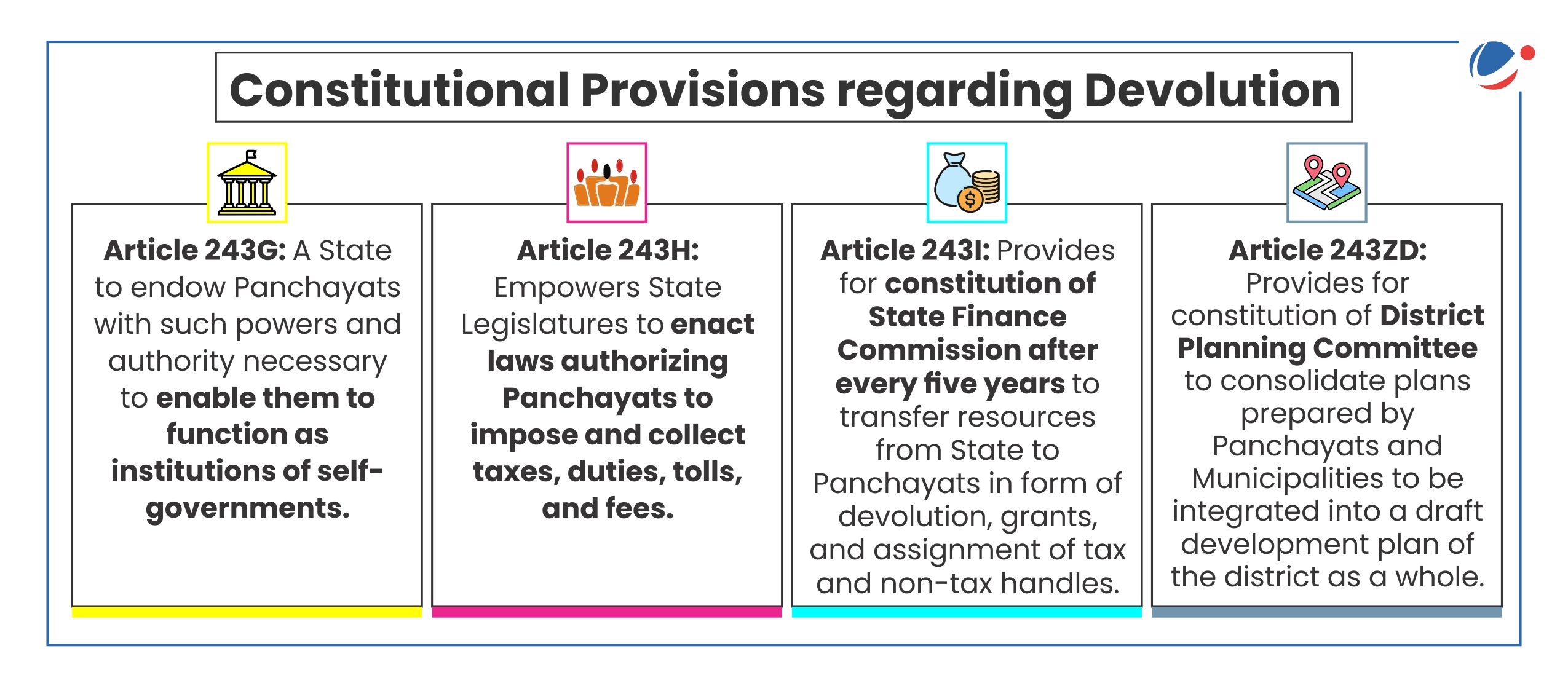Why in the news?
Recently, Ministry of Panchayati Raj has released a report titled "Status of Devolution to Panchayats in States – An Indicative Evidence Based Ranking".
Devolution to Panchayats in States report
- Report provides an in-depth analysis at how well Panchayats are equipped to fulfil their Constitutional roles under the 73rd Constitutional Amendment.
- Key Highlights of Report
- Panchayat Devolution Index: Ranks States/ UTs along 6-dimensions of devolution. (Refer Image)

- It was prepared by Indian Institute of Public Administration (IIPA), New Delhi.
- The 'function' dimension, which is the base of local self-governments, has the lowest national average among all 6 dimensions.
- Top 3 States in devolution are Karnataka, Kerala, and Tamil Nadu.
- Lowest 3 states/UTs are Dadra & Nagar Haveli and Daman & Diu, Puducherry, and Ladakh.
- Devolution has increased from 39.9% to 43.9% during 2013-14 to 2021-22.
- Capacity Enhancement component of index increased from 44% to 54.6% due to initiatives like Rashtriya Gram Swaraj Abhiyan (RGSA).
Importance of Devolution Index
|
About Devolution of Panchayat
- Devolution is concerned with passing on of powers, authority and rights and/or duties and responsibilities or funds from higher level of jurisdiction to lower level jurisdiction and making them autonomous in decision making.
- Local government, including panchayats, is a state subject in the Constitution, and consequently, the devolution of power and authority to panchayats has been left to the discretion of states.
- It is a form of administrative decentralization.


Challenges regarding Devolution of Panchayat
- Framework: Irregular elections, delays in delimitation or formation of ward etc. contradict with constitutional mandate such as holding regular elections (article 243 E).
- E.g. Delay in conducting elections to over 23,000 local bodies in Madhya Pradesh.
- Function: As per report, overall Panchayat Devolution Index is 43.89% (2021-22) due to Panchayats functions being limited to traditional civic duties, supervisory nature of intermediate and district Panchayats, parastatal bodies.
- Parastatal Bodies are set up by specific Acts of Parliament and managed by Boards of Directors appointed by government.
- Finances: Inadequate financial resources, heavy reliance on grants from centre/state government, and irregular constitution of State Finance Commission, impede the functioning of PRIs.
- Around 95 % of their revenues come from grants by higher levels of government.
- Functionaries: Lack of support staff and personnel such as secretary, shortage of technical and administrative staff, etc. leads to overburdening, and hampers efficient governance and service delivery at grassroots level.
- As per survey, one Panchayat Secretary manages on an average 17 Gram Panchayats in a State.
- Capacity Building: Inadequate infrastructure, lack of skills and regular training, digital infrastructure, and inadequate financial and personnel management impacts the functioning of Panchayats.
- Only seven states and UTs reported that 100% of their panchayat offices were pucca buildings.
- Over 40,000 GPs in the country still do not have any computers in India.
- Accountability: Limited people participation, lack of awareness of accountability measures have led to increased instances of corruption and misuse of funds by PRIs officials.
- E.g. 70% of panchayats in Krishna district (Tamil Nadu) have been misappropriating funds.
Recommendations as per Report
- Strengthening State Election Commission (SEC): All election related matters like fixing election dates, delimitation of constituencies should be vested with SEC. Further, have a common electoral role to be prepared and yearly modified.
- Reserved seats: Reservations for all categories should be frozen for at least two/three terms. Extending tenures on same seat for general candidates, women, as well as SC/ST candidates in general, to promote efficiency and effectively empower local leaders.
- Autonomy: Central Sector Schemes (CSSs) need to provide active roles to Panchayats in all State, and subjects listed in Eleventh Schedule be transferred to Panchayats and not to parallel bodies.
- Funding: State Finance Commission should be constituted timely every 5 years, reports should be tabled in state legislatures regularly, and steps should be taken to diverse funding sources of the PRIs.
- Accountability: Enforce strict financial accountability measures, regular and independent audits, and Public Financial Management System should be mandatory for all utilization certificates, releases, and transactions of expenditure, to prevent misuse of funds and corruption.
- Manpower: Panchayats should have authority to manage ad hoc staff, engage external experts, and receive adequate resources for staffing and infrastructure. Staff distribution must be based on workload and local needs for equitable allocation.
- A separate body (Local Government Service Commission) may be established to recruit employees.
- Capacity Building: Training PRI members through comprehensive curriculum in Local Public Service Management consisting of public systems, financial and personnel management, e-Governance etc. on the lines of MBA for Panchayat functionaries.






